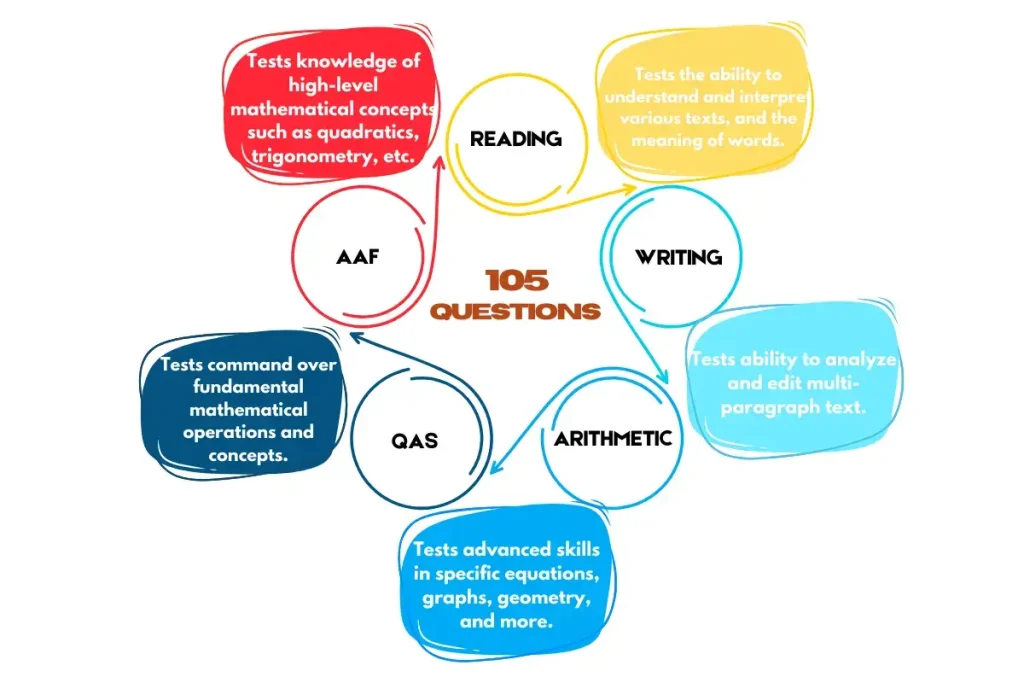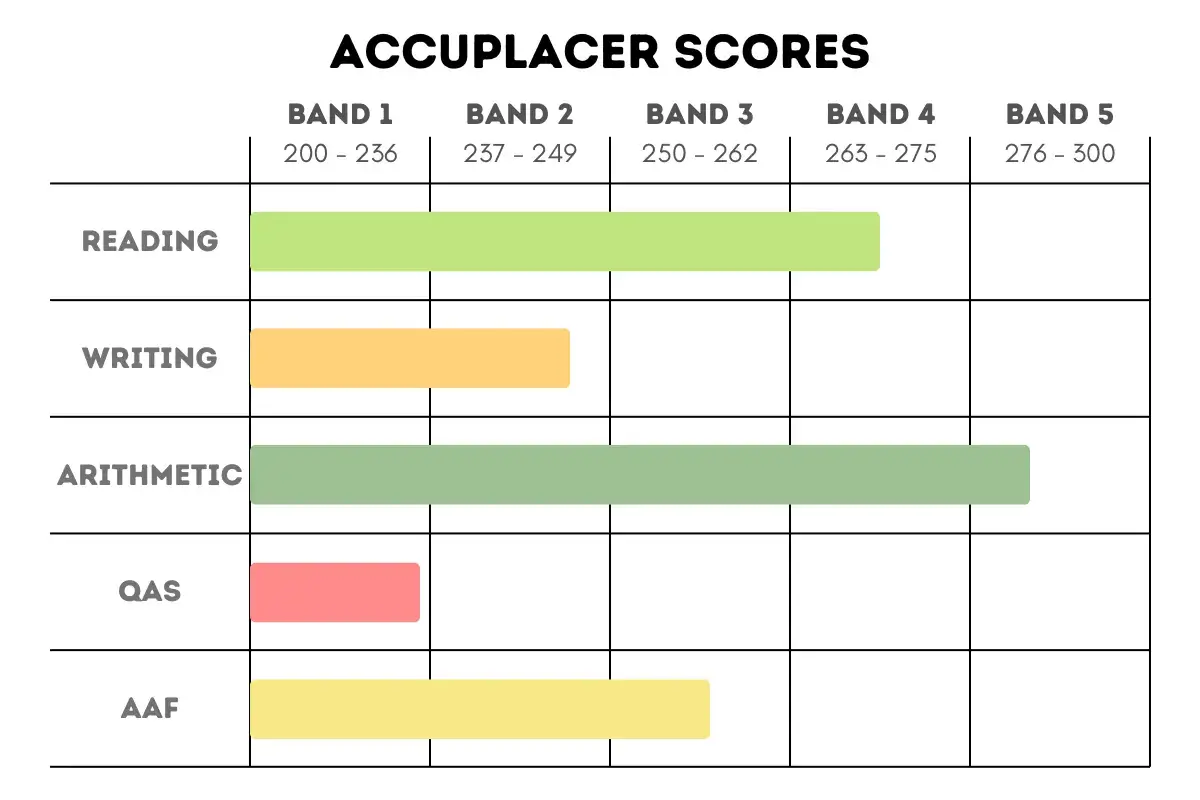Prepare for the ACCUPLACER Test in 2025: Comprehensive Prep Course
- Overview
- Test Format
- Test Scoring
- Curriculum
- FAQs
Taking the ACCUPLACER to start college or a training program, or to avoid extra classes? You’ve come to the right place. A good score can move you closer to your goals.
Our ACCUPLACER Prep Course fits everyone—high school students, returning learners, or anyone wanting better placement. We simplify the test’s adaptive format with clear lessons, practice questions and tips to help you succeed in Reading, Writing, Arithmetic, Quantitative Reasoning and Advanced Algebra.
About the ACCUPLACER Test
For over 30 years, the ACCUPLACER has been a trusted tool to check if students are ready for college. It also highlights areas where you might need a boost. The test covers five key skills:

The ACCUPLACER uses computer-adaptive testing, meaning it adjusts the question difficulty level based on your previous response. Answer correctly, and the next question gets harder. Miss one, and it gets easier. This makes every test unique and preparing for it important.
Your scores help colleges decide which courses you’re ready for—whether it’s college-level classes, preparatory courses, or training programs.
What’s on the ACCUPLACER Test?
The ACCUPLACER test has 105 questions across five areas: Reading (20 questions), Writing (25 questions), Arithmetic (20 questions), Quantitative Reasoning, Algebra, and Statistics (20 questions), and Advanced Algebra and Functions (20 questions). Each section tests specific skills to measure your readiness for college or training programs.
As noted earlier, its computer-adaptive design adjusts questions to your skill level for a personalized challenge. The test is untimed, so you can work at your own pace, usually finishing in 2 to 2.5 hours. Your scores help colleges place you in the right courses—college-level, preparatory or training programs.
Scoring on the ACCUPLACER Test
There’s no pass or fail on the ACCUPLACER—it’s all about scoring your strong and weak points. Scores range from 200 to 300, split across the five levels. Higher scores mean you’re ready for tougher college & courses, while lower scores can get you into average ones.
Here’s a quick breakdown of what each score range typically means for your abilities:

Each college uses your scores, along with other factors like your academic background, to place you in the right program.
Score validity varies by school (often 2–5 years for different subjects like math or reading), so check with your college for specifics. The table below summarizes what each score range means for each section.
| Band | Reading | Writing | Arithmetic | QAS | AAF |
|---|---|---|---|---|---|
| 200–236 | Understand simple texts, identify facts. | Edit simple texts, use basic sentence structure. | Add, subtract, multiply, divide, use decimals, order numbers. | Identify graphs, do basic integer operations, recognize coordinates. | Apply exponent rules, handle basic quadratics, find linear function outputs. |
| 237–249 | Find main ideas, connect multiple texts, infer details. | Edit moderate texts, use precise language, fix sentence errors. | Work with decimals, fractions, one-step problems. | Handle linear equations, rational expressions, unit conversions. | Manage linear equations, nonlinear relationships, simplify polynomials. |
| 250–262 | Identify themes, grasp text relationships, understand tough words. | Edit complex texts for clarity, organization. | Tackle multi-step problems with decimals, fractions, percentages. | Solve equation systems, rates/ratios, link graphs to linear equations. | Connect quadratic graphs to equations, use triangle properties, basic trig. |
| 263–275 | Analyze word choice, perspectives, connect texts. | Refine complex texts for main ideas, transitions. | Use order of operations, multi-step fraction problems, convert decimals. | Find slopes, exponents, probabilities, intercepts. | Handle rational equations, graph solutions, exponential equations. |
| 276–300 | Analyze complex claims, reasoning, text parts. | Refine tough texts, choose precise words, fix subtle errors. | Manage complex expressions, multi-step percentages, order results. | Solve perpendicular lines, absolute values, compare data sets. | Tackle quadratics, trig, logarithmic equations. |

ACCUPLACER Prep Course
Last Updated: Jul 28, 2025
Course Content
-
 Introduction 2 StepsBuy this Course: Get full access to all lessons, practice tests and guides.
Introduction 2 StepsBuy this Course: Get full access to all lessons, practice tests and guides. -
 ACCUPLACER Reading 4 StepsBuy this Course: Get full access to all lessons, practice tests and guides.
ACCUPLACER Reading 4 StepsBuy this Course: Get full access to all lessons, practice tests and guides. -
 ACCUPLACER Writing 4 StepsBuy this Course: Get full access to all lessons, practice tests and guides.
ACCUPLACER Writing 4 StepsBuy this Course: Get full access to all lessons, practice tests and guides. -
 ACCUPLACER Arithmetic 2 StepsBuy this Course: Get full access to all lessons, practice tests and guides.
ACCUPLACER Arithmetic 2 StepsBuy this Course: Get full access to all lessons, practice tests and guides. -
 ACCUPLACER Quantitative Reasoning, Algebra, and Statistics (QAS) 2 StepsBuy this Course: Get full access to all lessons, practice tests and guides.
ACCUPLACER Quantitative Reasoning, Algebra, and Statistics (QAS) 2 StepsBuy this Course: Get full access to all lessons, practice tests and guides. -
 ACCUPLACER Advanced Algebra and Functions (AAF) 2 StepsBuy this Course: Get full access to all lessons, practice tests and guides.
ACCUPLACER Advanced Algebra and Functions (AAF) 2 StepsBuy this Course: Get full access to all lessons, practice tests and guides. -
 ACCUPLACER Full Size Practice Quiz 2 stepsBuy this Course: Get full access to all lessons, practice tests and guides.
ACCUPLACER Full Size Practice Quiz 2 stepsBuy this Course: Get full access to all lessons, practice tests and guides.
Why Choose Accuplacer Prep Course?
In-depth Lessons: We break down ACCUPLACER from A to Z, equipping you with the knowledge, skills, and confidence required to excel.
Vast Question Bank: Dive into 250+ detailed questions equipped with step-by-step explanations and strategic approaches for acing them. We offer both timed and untimed test simulations that will help you experience the challenging test format.
Extensive Resource Library: Mastering theory has never been easier. Use our specialized learning resources on top of the in-depth lessons to truly solidify your understanding, helping you not just remember these concepts, but master them.
Interactive Quizzes: Put theory into practice with interactive quizzes that will take your preparation to the next level. These mimic real test conditions, helping you build confidence in your abilities.
Flexible Learning: Access the course materials from anywhere and at any time. Our online platform ensures that you can practice and improve at your convenience.
Success Stories
4.6 976 Reviews
rob, 16 Jan
Solid review course that covers the…
Solid review course that covers the relevant topics in good detail
chad, 11 Jan
Great Program, amazing practice simulations
Easy to understand. Passed tests on first time thru.
QUEEN RIGHTEOUS, 07 Jan
Highly recommended.Great instructional…
Highly recommended.Great instructional information. I passed on the first try.
MasterCommand, 14 Nov
Prepterminal. Prepare, practice, execute.
To say that Prepterminal helped me prepare and be ready for the testing phase would be an understatement. At first, looking at the course, I felt overwhelmed with the course material, but the course broke down each subject effectively which made it easier to understand. There were a few issues with some of the audio portion of the testing course, but beyond that, the course was well worth the money.
Abazix LLC, 09 Nov
Would recommend
Study material helped to pass my test on the first try.
Natalia M. Delgado, 08 Nov
Exelent course 100% guaranteed
Exelent course 100% guaranteed
FAQs
The ACCUPLACER is an online test that uses adaptive technology, which adjusts the difficulty of questions based on the student’s responses. As students answer questions correctly, the questions become more challenging; if they answer incorrectly, the questions become easier. This adaptive nature provides a personalized assessment experience.
The ACCUPLACER is an untimed test, allowing students to work at their own pace, typically taking about two to two and a half hours to complete all sections. The untimed nature helps reduce anxiety and provides a more accurate measure of a student’s abilities.
Reading comprehension scores from the ACCUPLACER are typically valid for five years, while math scores are valid for two years. This validity period allows flexibility in course planning and enrollment timing, though it’s essential to confirm with specific institutions as policies may vary.
You can change your answer to a question before submitting it, but once you submit an answer, it cannot be changed. This emphasizes the importance of reviewing your responses carefully before submission.
Retake policies for the ACCUPLACER vary by institution, so it’s important to check with your college for specific guidelines. Some schools may allow retakes to improve placement, offering students another opportunity to demonstrate their skills.
The ACCUPLACER Next Generation features updated test content and enhanced technology to provide a more accurate assessment of student skills, reflecting changes in educational standards and practices. This ensures the test remains relevant and effective in evaluating student readiness.
Many institutions offer the option to take the ACCUPLACER remotely, but it’s important to confirm with your college about the available formats. This flexibility accommodates various student needs and allows for more convenient scheduling.
Scores are typically available immediately after completing the ACCUPLACER test. This allows for quick feedback and timely planning for course registration and academic advising.
*Note: ACCUPLACER, TSI and other trademarks are the property of their respective trademark holders. None of the trademark holders are affiliated with PrepTerminal or this website.

Created by: Michael Lerner
BSc, Psychometric Tutor, Prepterminal Test Expert
6876 students, 4.6, 976 Reviews
Hey, I’m Michael, PrepTerminal’s Accuplacer Course expert. I am here to help you with any questions or concerns you may have about the Accuplacer Course. Feel free to contact me at [email protected].
